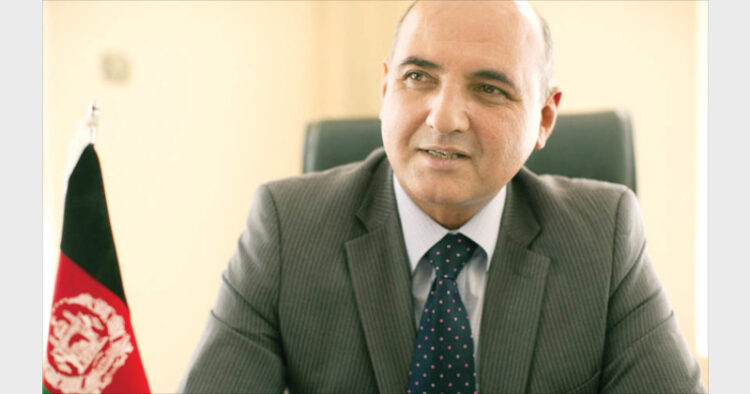Dr. Abdullah Haiwad is President of the Afghan Governors Assembly, which is a prominent Kabul-based body of 66 past and present Governors of the country. Haiwad was Governor of the Ghor Province in Afghanistan. He is currently under treatment at Alenya, Turkey, following a Covid attack and yet will respond to questions furnished to him. Dr. Abdullah spoke to the representative of Organiser Weekly. Excerpts from the interview:
Q: After a long presence in Afghanistan, the United States Army has almost left the country with ninety percent of the forces already gone; what is in store for Afghanistan
Dr. Abdullah Haiwad: America has left Afghanistan in a big mess, just as their other allies have done in the past. They have left Afghanistan at the mercy of God, and there is a lot of uncertainty moving forward.
Q: Even as the US army has started leaving Afghan, the Taliban has stepped up attacks and have claimed to have seized power in several districts. Your comments?
Dr. Abdullah Haiwad: The Taliban can't have captured these districts alone. If what they claim is true, the Pakistani government and the ISI had some involvement. It is to be noted that Pakistan has created the Taliban and issues regular instructions to the Taliban ever since it was created. The Taliban does not have any financial resources and entirely relies on Pakistan's ISI and military for money and weapons, and cash to pay the salary of its foot soldiers.
Q: India has made substantial investments in infrastructure, health, and education in Afghanistan. What will happen to these once the Taliban seizes power?
Dr. Abdullah Haiwad: The Taliban will never have the sole power of Afghanistan. An agreement might take place allowing joint leadership; however, even if this happens, it will not affect India's investments. It might mean that further projects in Afghanistan may not take place. However, any current projects will be left alone.
Q: Pakistan trained Almost all Taliban leaders, and will it be a proxy Pak rule in Afghan if the Taliban assumes office?
Dr. Abdullah Haiwad: if the Taliban takes over, it will be a proxy Pakistani government ruling Afghanistan; however, the chances of taking over are slim.
Q: China and Russia have evinced interest in Afghanistan. Your comments?
Dr. Abdullah Haiwad: The Chinese and Russians will protect their investments in Pakistan and look after their interests.
Q: If the Taliban seize power, will there be a curtailment of women's freedom
Dr. Abdullah Haiwad: After the Taliban left office, there has been a significant improvement in Women's life in Afghanistan, and women were enrolled even in the army and police, and many became lawmakers. There will be, to some extent, curtailment of this freedom but not wholly.
Q: When the Taliban seized power earlier, they hanged the then President Najeebullah. If they retake control, what is in store for the present elected leaders of the country?
Dr. Abdullah Haiwad: The world is now watching Afghanistan. The information will reach far and wide immediately. Hence, it is no longer possible for Pakistan to allow that kind of thing to happen in the country again.
Q: There are unconfirmed reports that India has entered back door negotiations with the Taliban. Your comments?
Dr. Abdullah Haiwad: I have seen no proof that India has allied with any terrorist organisations, so these reports are untrue.
Q: Will a new Afghan regime be supportive of a Pakistan act against Indian interests in Kashmir?
Dr. Abdullah Haiwad: A new regime supporting Pakistan will undoubtedly interfere with India's internal affairs; both Kashmir and Pakistan occupied Kashmir.
Q: What is the role of Iran in the emerging politics of Afghanistan?
Dr Abdullah Haiwad: Iran has historically been a close ally to Pakistan, and together they have worked against the interests of Afghanistan for years. Iran has been actively helping to maintain the war in Afghanistan to keep the government in a weakened situation.
Q Will the education of women be affected if the Taliban comes to power in the country?
Dr Abdullah Haiwad: As I have said earlier, times have changed, and the entire world is watching the developments in Afghanistan. I don't think that women's education is affected, but certainly, some restrictions may be put in place.
Q: In several forums and on social media platforms like Twitter, you had spoken about Afghanistan supporting a free Balochistan. Is this simple rhetoric or a healthy thought about Afghan national policy?
Dr Abdullah Haiwad: As you know, before India and Pakistan got freedom from British Colonialism, Balochistan got its independence and had its national flag, lower and upper houses of Parliament, and a President or Amir as you may call it. However, on 27 March 1948, Balochistan was occupied by the Pakistanis, and ever since, the Balochis have been seeking freedom.
As the first President of Afghanistan, Mohammed Daud Khan had encouraged Balochis to seek their freedom and an armed struggle was waged in 1973, but Pakistan, with the support of Iran and its French Mirage Jets, crushed it. Dr. Najibullah had also tried to help the Balochis get their freedom, but unfortunately, he was also assassinated.
If Afghanistan is to be free of terrorists, then Balochistan has to be a free nation as almost all the terror bases of Pakistan are based either in Pashtunistan or Balochistan.













Comments